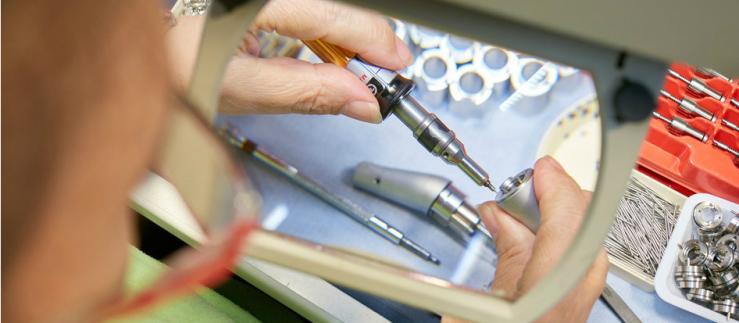Chile was the first OECD-Member of South America, is the most developed country in Latin America and leads many regional rankings, such as the WEF’s Competitiveness Index. In comparison to its neighbors, it is known for its political stability, legal certainty and business friendliness. Chile is well connected in international trade and has signed more free trade agreements than any other country in the world. The relation to Switzerland is well established with a Free Trade Agreement (EFTA), a double tax treaty and investment protection agreement, having already attracted more than 200 Swiss companies.
The Medtech market in Chile has been growing steadily and reached a market size of 979 million USD in 2019 (+25% since 2016). With a 95% import rate, the main suppliers are international companies with subsidiaries in Chile and local representative firms, with the main countries supplying medical devices being the United States (33.3%), followed by Germany (14.0%) and China (10.5%). Switzerland, although known as a major exporter of medical devices, so far accounts for only 2.5% of Chile’s imports (25 million USD, 2020).
The main categories imported correspond to consumable medical devices. However, in recent years, imports of diagnostic imaging equipment, orthopedics and prosthetics, assistive devices and dental products have increased considerably.
Why should a Swiss or Liechtenstein Medtech company be interested in Chile?
Beat Strüby: Chile offers attractive market and regulation conditions that allow for a smooth and organized market entry process. You can expect a steep learning curve and rapidly test strategies to potentially be implemented in other markets of the region.
It’s important to notice, that Chile has a strong import base for medical devices (95%). The country has only a few local producers, which results in a high acceptance of imports and low risk of dumping. Customs backs this practice with transparent import procedures and a Free Trade Agreement with EFTA to reduce the tax load. Furthermore, Chile could be used as a Latin America hub, given its 29 Free Trade Agreements in force and economic initiatives such as the Pacific Alliance, which allow companies to export medical devices of Swiss origin free of customs duties to Chile and then to other countries. In this way, Chile can act as a mid-point for triangular distribution to the other Latin American countries, as well as to the Asian Pacific market.
Chile has a stable regulatory framework and a centralized institution (Instituto de Salud Pública) in charge of the control, inspection and surveillance processes of all stages of the life cycle of a medical device. Obtaining the mandatory registration for a medical device is a semi-presential process that costs around USD 170 per product, takes an average of 60 working days and is valid indefinitely.
What opportunities do you see in Chile in the short and midterm?
Beat Strüby: The year 2020 was very challenging for the health system in Chile. The COVID 19 Pandemic made it necessary to mobilize large resources to strengthen the installed capacity for diagnosis and treatment and to respond in the best way to the needs of the population. In this sense, the role played by the Medtech companies in Chile (local representatives) is fundamental, since Chile, not being a local producer of diagnostic kits or artificial respirators, was able to access these devices in a timely manner thanks to local experience in the import processes.
The health resources mobilized to face the pandemic have generated the need to reorganize and prioritize investments in the health sector, especially the public sector, visualizing opportunities in Medtech in the short and medium term:
Ley de cancer
Recently enacted in Chile, the National Cancer Law seeks to guarantee all patients with a well-founded suspicion of suffering from this disease, access to the diagnosis and medical treatment of this pathology. The implementation of this law considers the creation of a series of measures, among which are the elaboration of a National Cancer Plan, the creation of a national fund to ensure the continuous financing of this health policy, the creation of a high-resolution National Oncology Network and the strengthening of the quality of clinical services through the training of new specialists and access to state-of-the-art medical treatments.
The implementation of this health policy estimates an annual investment of 28 million USD in oncology equipment and infrastructure until 2028, which could be an interesting opportunity for Swiss medical technology companies in the oncology area, who are interested in coming to Chile or strengthen their presence in the region.
Ley de farmacos II
A modification to the regulation for medical devices in Chile is under legislative discussion, whose objective – amongst others – is to strengthen the processes of surveillance and control of medical devices distributed in the country. In this sense, the new regulation seeks to "strengthen the standard" about distribution of medical devices in Chile, taking as a reference the regulations of countries with high sanitary surveillance, including Switzerland. In this sense, it is possible that local distributors will start prioritizing the search for products manufactured in countries such as Switzerland.
Investments in health infrastructure
The current government’s program proposes the modernization of the health infrastructure through the creation and implementation of new hospitals. In the national plan for investments in hospital projects, there are currently 33 hospitals in execution and 11 in the bidding process, the equipment of these hospitals, especially those of high complexity, will require medical devices of high precision and quality.
In parallel, aiming at a more connected, equitable and non-discriminatory health, a new model of Digital Health focused on the Electronic Clinical Registry, Interconsultations via Telemedicine and Telerehabilitation with IoTs is being implemented. The telemedicine care model was strongly positioned during 2020 in Chile and shows great acceptance by the population. With the recent 5G tender (the first in Latin America), there are great opportunities not yet explored in this area.
Education of medical staff
The Chilean medical community is constantly searching for new trends in medical treatments and technologies at a global level. This creates a strong need for specialization and training courses in developed countries. Upon their return to Chile, the doctors demand to have the latest infrastructure and technology, which they have known abroad. As a result, a high level of medical competence has been formed in the country, which has allowed Chile to position itself as a pioneer in the introduction and implementation of new medical technologies in the region.
What recommendations do you have for Swiss companies interested in the Chilean Medtech market?
Beat Strüby: While not required by law, in practice it is advisable to have a local representative (own or third party) for the successful promotion and sale of the imported products. The main promotion channels to make new medical technologies known are national fairs like Expo-Hospital and Expodent, the medical associations of the different specialties and the Association of Health Industry Suppliers (APIS). The commercialization is traditionally done in two ways, in the public sector through tenders on the online platform “Mercado Público” and in the private sector through direct negotiation.
Our research shows that the market values the "local support" that companies can deliver throughout the life cycle of their products. It is important to establish training procedures so that post-sales support in Chile follows the culture of the Swiss company. This is a differentiating attribute that the market desires and therefore is important to keep in mind.
Do you have any relevant other information?
Beat Strüby: Chile is an open and competitive market in the Medtech industry, which makes it attractive not only for doing good business, but also for gaining experience and then strengthening other markets of interest in the region. Being an emerging country, the price factor, although not decisive, is important to consider since cost-efficient solutions are highly desired. Being open to a differentiated price structure in the region could facilitate the positioning of the Swiss Medtech industry, which is rather little known.
With the arrival of 5G, great opportunities are opened in digital health, which could be interesting to explore for Swiss companies that are developing solutions in telemedicine, digitalization, and other related fields.
Our research from the past few years shows that there are recurring characteristics of Swiss products that are present in the Chilean market and that generate an interesting demand:
- Products that require the highest precision (e.g. instruments for minimally invasive surgery).
- Products used in medical fields, which are known to have a very low tolerance rate for errors (e.g. neurosurgery, neonatology).
- Products that require a long service life (e.g. implants).
Currently, Chile imports medical devices from developed countries in the areas of imaging, radiotherapy, surgery, ophthalmology, prosthetics (among others), where the Swiss industry has much to contribute.
If we sparked your interest in Chile, take a look at our further documentation or contact us for an individual consulting session.
About Beat Strüby
Beat Strüby is Chief Executive Officer of Medic Solutions, a company that strives to provide its patients with early access to state-of-the-art drugs and appropriate medical devices, that are not available or inaccessible in Chile. In the past 5 years the company managed to introduce its own new Medtech product lines to the Chilean market and offer a wide range of consulting services about market introductions and regulations to foreign companies, including mandates with S-GE.






